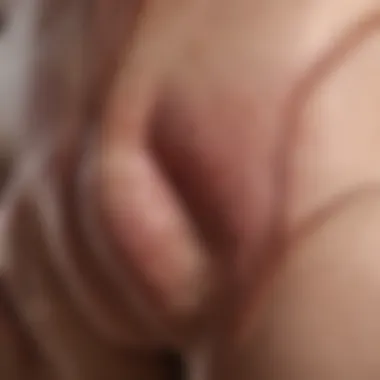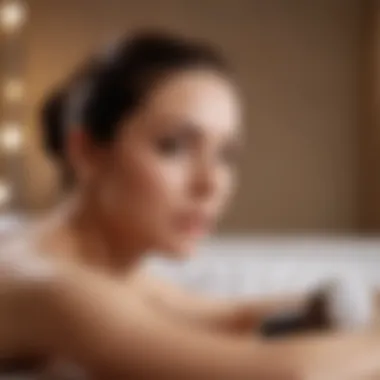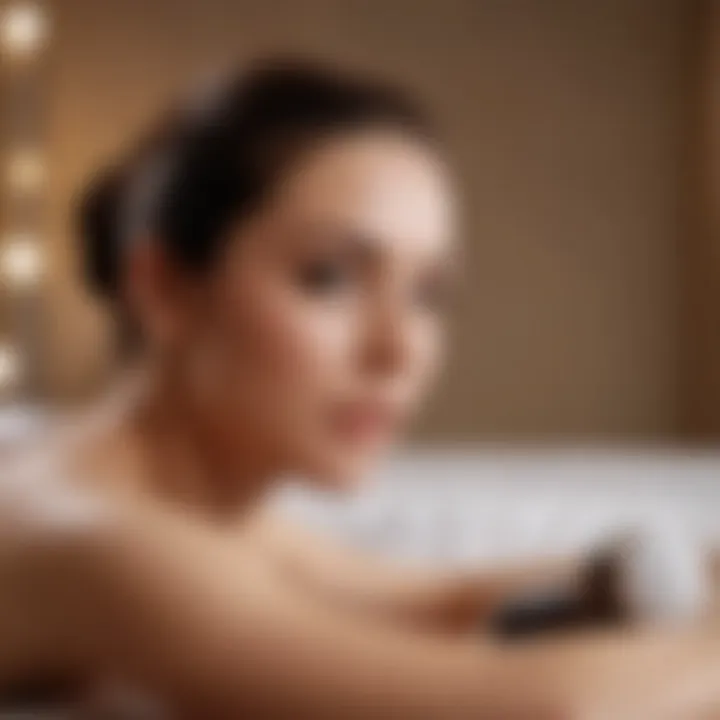Effective Techniques to Clear Butt Blackheads


Intro
Dealing with blackheads can be frustrating, especially when they pop up in unexpected places like the buttocks. Most people think of blackheads as a common problem for the face, but they can occur anywhere there are hair follicles, including the skin around the butt. This article sheds light on the reasons behind blackhead formation in this area and the steps one can take to tackle them effectively.
What Causes Blackheads on the Butt?
Blackheads form when hair follicles get clogged with oil, dead skin, and bacteria, leading to a small dark plug. In the case of buttocks, factors such as sweat, friction from clothing, and a lack of proper exfoliation contribute significantly to this issue. Furthermore, hormonal changes and an imbalance of skin oils can exacerbate the problem, making it crucial to understand both the internal and external elements affecting one’s skin health.
Key Takeaways
- Blackheads can develop in various regions of the body, including the buttocks, due to clogged hair follicles.
- Factors contributing to the development of blackheads include sweat, friction, hormonal changes, and inadequate skincare.
- A tailored skincare routine can effectively reduce and prevent blackheads, promoting healthier skin.
"Taking care of your skin is not just about appearance; it's an essential part of well-being that impacts how you feel in your own skin."
Practical Tips
When it comes to getting rid of blackheads on the butt, a few practical steps can lead to significant improvements:
- Cleansing: Choose a gentle exfoliating body wash to use daily. Look for products containing salicylic acid, which can help keep pores clear.
- Exfoliation: Schedule regular exfoliation sessions. Using a scrub or an exfoliating glove once or twice a week keeps dead skin at bay.
- Moisturizing: Keep your skin hydrated with lightweight, non-comedogenic moisturizers. Look for ones containing ingredients like aloe vera or hyaluronic acid.
- Avoid Tight Clothing: Loose-fitting clothing can help reduce friction. Choose breathable fabrics made from natural fibers, especially when exercising.
- Diet Consideration: A diet rich in antioxidants and low in refined sugars can support healthier skin from within.
Implementing these practices will not only help in banishing blackheads but also encourage overall skin health. Knowing your skin and adapting your routine to its specific needs is fundamental. Stay tuned as we delve further into various treatment options and preventive measures that can significantly enhance your skincare journey.
Understanding Blackheads
To effectively eliminate blackheads on the butt, it is critical to first understand what they are, how they form, and how they compare to other skin conditions. This foundational knowledge not only aids in identifying effective treatments but also informs preventive measures to reduce future occurrences. Grasping the concept of blackheads enables individuals to approach the issue with informed strategies tailored to their specific skin type and lifestyle.
Defining Blackheads
Blackheads are a type of acne lesion characterized by open comedones. These small dark spots appear when hair follicles become clogged with excess oil, dead skin cells, and bacteria. The distinctive color seen is not dirt but rather the result of a reaction between the skin’s oil and air, leading to oxidation. While often associated with facial skin, blackheads can occur elsewhere, including the buttocks, where the skin can be prone to similar issues.
The Formation Process
Understanding how blackheads form is essential to tackling them effectively. Various factors contribute to their development:
- Sebum Production: The body's sebaceous glands secrete oil, known as sebum, which can build up if not regularly cleansed.
- Dead Skin Cells: Accumulation of dead skin can block pores, causing a sticky environment conducive to blackhead development.
- Bacteria: Propionibacterium acnes, a bacteria that thrives in clogged pores, can also play a role in the formation and inflammation of blackheads.
In the butt region, the combination of moisture, sweat, and friction from clothing may further exacerbate this process, making it a common area for blackhead formation.
Differences Between Blackheads and Other Skin Issues
While blackheads are a common concern, it’s crucial to distinguish them from other skin issues, such as whiteheads and cystic acne. Here’s how they differ:
- Blackheads: Open comedones; dark in color; non-inflammatory.
- Whiteheads: Closed comedones; skin remains over the clogged pore; white or skin-colored.
- Cystic Acne: Inflammatory lesions filled with pus; deep-rooted and painful.
Understanding these differences greatly impacts treatment approaches. Notably, while blackheads may be less severe than cystic acne, they still require attention to prevent further skin complications.
"Primary knowledge of blackheads and their formation is half the battle won in keeping skin smooth and blemish-free."
In summary, knowing the definition, formation process, and how to differentiate blackheads is vital for anyone dealing with this condition. This insight paves the way for effective treatments and prevention strategies, keeping blackheads at bay.
Causes of Blackheads on the Butt
Understanding why blackheads form on the buttocks is essential for anyone grappling with this common skin issue. Being aware of the various causes can guide you toward effective solutions and preventative measures. The skin in this area is unique; it deals with both friction and moisture, making it particularly susceptible to clogged pores. Recognizing the underlying reasons for these pesky blackheads can lead to more effective management strategies in your skincare regimen.
Hormonal Changes
Hormonal fluctuations often bear significant influence on skin conditions. When hormones fluctuate, especially during puberty, menstrual cycles, or even pregnancy, the sebaceous glands can become more active. This overproduction of oil, or sebum, can lead to clogged pores, which is a primary factor behind blackhead formation.
In instances of hormonal imbalance, individuals might notice more pronounced breakouts on their buttocks. These changes can also be prompted by factors such as stress or certain medications that disrupt hormone levels. Keeping an eye on your hormonal health and seeking balance can have a positive impact on your skin's clarity.
Dietary Influences


What you put in your body can greatly affect your skin's health. A diet high in sugars and processed foods can increase oil production, contributing to the likelihood of blackheads. Foods that promote inflammation tend to exacerbate skin conditions. On the flip side, incorporating a balanced intake of fruits, vegetables, and healthy fats can help maintain skin elasticity and reduce oiliness. Some nutrients are particularly beneficial:
- Omega-3 Fatty Acids, found in fish and flaxseeds, are known for their anti-inflammatory properties.
- Antioxidants, which can be found richly in berries, help combat free radicals and promote healthy skin.
Considering how the foods you consume affect your skin can be a game changer in prevention strategies.
Hygiene Factors
Maintaining proper hygiene is crucial when it comes to skin care, especially in areas prone to blackheads. Neglecting to cleanse the skin regularly can lead to dirt and bacteria accumulation. Additionally, using heavy, occlusive products can result in blocked pores. Here are a few hygiene practices to consider:
- Regular cleansing: Use a gentle cleanser daily to remove sweat, dirt, and oil.
- Exfoliation: Regularly remove dead skin cells to prevent clogging.
Taking these steps can significantly decrease your chances of developing blackheads.
Clothing and Friction
Believe it or not, what you wear can directly impact skin health, particularly regarding blackhead formation. Tight clothing can create friction, trapping moisture and heat against the skin, leading to clogged pores. This is especially true for materials that don’t breathe well, such as synthetic fibers. Opting for loose-fitting, breathable fabrics allows the skin to stay ventilated, reducing the risk of blockages. Furthermore, incorporating regularly laundered clothing into your routine can significantly help in minimizing the buildup of oils and dirt that often leads to blackheads.
Key Takeaway: Blackheads on the butt are not just a cosmetic annoyance; they reflect underlying factors such as hormonal changes, diet, hygiene, and clothing choices that require attention in your skincare strategy.
Skincare Routine for Prevention
Maintaining a proper skincare routine is like laying a strong foundation for a house; it’s essential for preventing blackheads on your buttocks. A consistent regimen not only helps to keep the skin clear but also aids in improving its overall health. With the right practices in place, you can significantly reduce the formation of blackheads and enjoy smoother skin. Here are the key elements to focus on:
Cleansing Practices
Cleansing is the cornerstone of any skincare routine. It’s crucial to remove dirt, oil, and dead skin cells that can accumulate, especially in areas prone to blackheads. For effective cleansing, choose a gentle cleanser that suits your skin type.
- Opt for products labeled as non-comedogenic, meaning they won’t clog pores.
- Look for formulations that contain salicylic acid; this ingredient penetrates deeply and helps in exfoliating the inside of your pores.
- Consider washing your buttocks with a loofah or a soft washcloth to provide a gentle mechanical exfoliation while cleansing.
It's recommended to cleanse at least twice a day—morning and night. This practice not only reduces excess oil but rejuvenates the skin, making it more receptive to the following steps in your routine.
Exfoliation Methods
Exfoliation is vital for keeping your skin fresh and free from blackheads. By sloughing off dead skin cells, you prevent the build-up that leads to clogged pores. There are various options to incorporate into your routine:
- Chemical Exfoliants: Products containing alpha-hydroxy acids (AHAs) and beta-hydroxy acids (BHAs) can be exceptionally beneficial. They work by dissolving the bonds holding dead skin cells together, making it easier to shed them.
- Physical Exfoliants: A gentle scrub or product with ingredients like sugar or salt can provide a physical means of exfoliation. However, you'll want to be careful not to overdo it to avoid irritation.
Aim to exfoliate 1-2 times a week. Over-exfoliating can break down your skin barrier and trigger more oil production, leading to more blackheads.
Moisturizing Techniques
Many might think that moisturizing is only for dry skin, but this couldn't be further from the truth. Even oily skin requires hydration. Using the right moisturizer can actually prevent the overproduction of oil that contributes to blackheads.
- Water-Based Moisturizers: These are often lighter and won’t clog your pores. Ingredients like hyaluronic acid are excellent choices as they provide hydration without heaviness.
- Incorporate Ingredients that Help: Look for moisturizers containing niacinamide or retinol. These ingredients can help to regulate oil production and improve skin texture.
Apply moisturizer after cleansing and exfoliating while the skin is still slightly damp to lock in moisture effectively. A consistent moisturizing routine keeps the skin supple and less likely to experience breakouts.
Remember, a little effort goes a long way. Keeping a consistent skincare regimen can make a world of difference in maintaining the health of your skin and preventing stubborn blackheads on the buttocks.
Treatment Options for Blackheads
When it comes to addressing blackheads on the butt, selecting the right treatment options is essential. This isn’t just about getting rid of those pesky spots; it’s about fostering a comprehensive skincare regime that keeps your skin looking its best. Each treatment has unique benefits and considerations that can play a crucial role in skin health.
Whether you choose to go the over-the-counter route or consult a professional, understanding what’s available can help you make informed decisions tailored to your skin type and lifestyle.
Topical Treatments
Topical treatments are often the first line of defense against blackheads. These products typically contain active ingredients that help to unclog pores and exfoliate the skin. Common ingredients include salicylic acid, benzoyl peroxide, and glycolic acid. Each of these plays a different role:
- Salicylic Acid: Best known for its oil-soluble properties, it penetrates deep into the pores, effectively dissolving debris and preventing blackheads.
- Benzoyl Peroxide: This ingredient works by killing bacteria and reducing inflammation, helping to prevent further breakouts.
- Glycolic Acid: It gently exfoliates the skin’s surface, making it less likely for old skin cells to clog pores.
When choosing a topical treatment, pay attention to your skin’s sensitivity. It may take a bit of experimentation to find the right balance, and results often take time to show. Be patient, as rushing the process can lead to irritation and worsen the situation.


Professional Extractions
If you’re facing stubborn blackheads that refuse to budge with at-home treatments, professional extractions might be the way to go. Performed by dermatologists or licensed aestheticians, these procedures involve the careful removal of blackheads using specialized instruments.
"Professional extractions can help in achieving a clearer complexion, but they should be performed in a sterile environment to avoid complications."
The benefits of professional extractions include:
- Immediate Results: You will likely see a swift improvement in skin clarity.
- Expert Care: Trained professionals know how to extract without causing undue harm to the surrounding skin.
However, be mindful of any risks involved. Improper extraction can lead to scarring or infection, so choose reputable professionals and follow any aftercare advice they provide.
Chemical Peels
Chemical peels are another effective option for those looking to tackle blackheads. This procedure involves applying a chemical solution to the skin, which exfoliates the outer layers, revealing fresh skin underneath. Depending on the depth of the peel, results can vary significantly:
- Superficial Peels: Typically use mild acids and require little downtime. They can effectively treat early stages of blackheads.
- Medium and Deep Peels: These offer more dramatic results but come with longer recovery times. They can address significant blackhead issues and improve overall skin texture.
Pros of chemical peels:
- Promotes Cell Turnover: This leads to smoother skin and fewer future breakouts.
- Reduction in Pore Size: Regular treatments can contribute to a more refined skin appearance.
Before committing to a peel, consider discussing any skin sensitivities or conditions with your dermatologist to ensure it’s a suitable option for you.
Laser Therapy
Laser therapy is a more advanced treatment for blackheads and entails the use of focused light to target the skin’s surface. This option can help to eliminate persistent blackheads and enhance overall skin texture by stimulating collagen production. Types of laser treatments include:
- Fractional CO2 Laser: Ideal for deep, stubborn blackheads, as it targets the underlayers of the skin.
- Pulsed Dye Laser: Effective for reducing redness and inflammation typically associated with acne-related issues.
While laser therapy can provide longer-lasting results, it may require multiple sessions. Possible side effects can include redness and swelling post-treatment, but these usually diminish within a few days. It's crucial to consult with a qualified practitioner who can assess your skin type and the potential risks involved.
In summary, knowing your options for treating blackheads on the butt is vital for achieving your desired results. Considerations like skin sensitivity, expected downtime, and personal lifestyle will influence your choice. Prioritize safety and effectiveness by choosing methods that align with your healthcare needs.
Home Remedies for Blackheads
Home remedies can play a significant role in managing blackheads, especially for those who prefer a more natural approach to skincare. By utilizing ingredients that are often found in one's kitchen, individuals can address this common skin issue effectively. The advantages of home remedies not only include cost-effectiveness but also the incorporation of gentler solutions that often lack harsh chemicals. People seeking to maintain healthy skin appreciate remedies that minimize potential irritation while providing tangible results.
Natural Exfoliants
Exfoliation is a key step in preventing blackheads. Natural exfoliants can gently slough away dead skin cells, which reduces the chances of clogged pores. One popular choice is the humble combination of sugar and coconut oil. Sugar granules work as a physical exfoliant, while coconut oil possesses moisturizing properties. When mixed, they create a paste that can be massaged into the skin. Just be careful as too much pressure can cause irritation.
Another option is oatmeal, which is not just for breakfast. When ground into a fine powder and mixed with honey, it forms a soothing yet effective scrub. Oatmeal has anti-inflammatory properties that promote skin healing, making it an ideal choice particularly for sensitive areas like the butt. Incorporating these ingredients into a weekly skincare routine can make a noticeable difference over time, keeping the skin on the buttocks smooth and blackhead-free.
Clay Masks
Clay masks are a powerhouse when it comes to purifying the skin. Bentonite and kaolin clays are especially effective at absorbing excess oil and toxins. To create a simple clay mask, mix either clay with water or apple cider vinegar to achieve a paste-like consistency. Applying this to the affected areas can draw out impurities, leaving behind clearer skin.
It’s worth noting that while these masks can help with blackheads, they should not be overused. A mask applied once a week is usually enough to see improvements. Also, those with sensitive skin should start with shorter application times to ensure there are no adverse effects. Clay masks offer not just the benefit of cleaning; they can also feel refreshing and rejuvenating, adding an element of self-care to the skincare routine.
Steam Treatments
Steaming is an often-overlooked method that can work wonders in the fight against blackheads. By opening up the pores, steam allows for easier extraction of buildup. For a DIY steam treatment, simply bring water to a boil, pour it into a bowl, and carefully lean over it with a towel draped over your head to trap the steam.
The recommended duration for such a treatment is 5-10 minutes, followed by a gentle exfoliant or clay mask to capitalize on the effects of steaming. It's essential to keep in mind that this method might not suit everyone, particularly those with certain skin conditions like rosacea, where heat can exacerbate the issue.
In Summary
Utilizing home remedies for treating blackheads can provide safe, effective, and budget-friendly solutions. The routines involving natural exfoliants, clay masks, and steam treatments allow individuals to embrace a holistic approach to their skincare. This natural path not only promotes smoother skin but also encourages a deeper connection with one's body, reminding us that sometimes the best solutions are right at home.
Remember, consistent care is key. Small adjustments to your routine can lead to significant improvements over time.


Lifestyle Adjustments
Making key lifestyle adjustments is vital in the quest to eliminate blackheads on the buttocks. These changes can foster an environment that minimizes the likelihood of blackheads forming while improving overall skin health. By focusing on daily habits, dietary decisions, and even your stress levels, you can really transform your skin from the inside out.
Dietary Changes for Skin Health
Your diet plays a significant role in the condition of your skin. A well-balanced, nutrient-rich diet can do wonders. It’s not just about avoiding junk food or sugary snacks; it’s about what you include in your meals.
- Increase Omega-3 Fatty Acids: Foods rich in omega-3s, like salmon, walnuts, and flaxseeds, can help reduce inflammation. This is particularly important since inflammation can contribute to the formation of blackheads.
- Stay Hydrated: Drinking enough water is crucial. Hydration helps your skin maintain elasticity and helps flush out toxins that cause skin issues.
- Antioxidant-Rich Foods: Incorporate fruits and vegetables, especially berries and leafy greens. These foods are packed with antioxidants that combat free radicals, keeping your skin looking fresh.
- Limit Processed Foods: Reducing intake of processed foods can help, as these often contain ingredients that disrupt hormonal balance, potentially leading to increased oil production and clogged pores.
By being mindful about what you consume, you can dramatically improve not just the appearance of your skin but also its health in the long run.
Choosing the Right Fabrics
The choice of clothing fabric might seem trivial, yet it can immensely impact skin health. Certain fabrics trap heat and moisture, creating an ideal breeding ground for bacteria and clogged pores.
- Breathable Fabrics: Opt for natural fabrics like cotton and linen, which are breathable and allow sweat to evaporate. This reduces the chances of sweat mixing with oils and debris, leading to blackheads.
- Avoid Synthetic Materials: Fabrics like polyester can trap moisture. This can lead to increased friction and irritation on the skin, making it more prone to issues like blackheads.
- Loose Fitting Clothes: Tight clothing can cause friction, leading to irritation. Loose clothes allow air circulation, lessening the risk of irritation and thereby reducing the chances of blackheads.
Choosing the right fabrics is an easy step, but one that can contribute significantly to skin health and comfort.
Managing Stress Levels
Stress is another underlying factor often overlooked. When stressed, your body produces more cortisol, a hormone that can increase oil production in your skin, hence exacerbating blackhead formation.
- Regular Exercise: Physical activity is a great way to manage stress. It not only improves your mood but also enhances circulation, helping carry vital nutrients to the skin.
- Mindfulness and Relaxation Techniques: Incorporating practices such as yoga, meditation, or even simple breathing exercises can help lower stress levels. The calmer you are, the better your skin might respond.
- Adequate Sleep: Never underestimate the power of a good night’s sleep. Sleep is the body’s time to repair and rejuvenate, including the skin. Aim for at least seven hours of quality sleep each night.
Managing stress is not just about feeling good mentally; the rewards extend to your skin health. Taking proactive steps to lower stress can minimize blackhead occurrences and enhance overall skin vitality.
Remember: Small adjustments in lifestyle can lead to big transformations in skin health. The journey to healthier skin is about consistency, awareness, and dedication.
When to Seek Professional Help
Navigating the world of skincare, especially when it comes to addressing stubborn blackheads, can sometimes feel like walking through a maze. While many blackhead issues can be managed through diligent home care, there are instances where consulting a professional becomes not just beneficial but crucial. Understanding when to seek help can save time, enhance results, and provide reassurance.
Signs That Require Medical Attention
It's essential to recognize the signs that indicate a need for professional intervention. Here are some key indicators:
- Inflammation: If the affected area appears red, swollen, or painful, it could signify an infection or an advanced form of acne.
- Persistent Blackheads: When blackheads remain despite following a consistent skincare regimen, it may suggest that deeper issues could be at play.
- Scarring: If you notice scars or hyperpigmentation developing where blackheads occur, it’s time to consult a dermatologist to prevent further damage.
- Sudden Changes: Any sudden changes in the skin’s appearance or texture can warrant a visit. Skin can sometimes signal underlying health concerns.
"Never underestimate the importance of your skin; it's the body's canvas and a reflection of overall health."
Consulting a Dermatologist
When it comes down to consulting a dermatologist, the decision can seem daunting, but understanding its importance opens the doors to effective solutions. Dermatologists bring a wealth of expertise and can provide tailored advice and treatments suited to individual skin types. Here's what to consider:
- Personalized Treatments: A dermatologist can recommend treatments that cater specifically to your skin type and the severity of your blackheads.
- Prescription Options: Over-the-counter products might not cut it. In such cases, a dermatologist could prescribe stronger topical treatments, like retinoids or antibiotics, that are far more effective.
- Confidence in Care: Having a professional by your side can provide comfort and clarity, ensuring you aren't left to navigate the complexities of skincare alone.
- Advanced Procedures: Sometimes, issues may require interventions beyond topical treatments, such as professional extractions or chemical peels. These can yield results that home remedies simply can't.
Seeking professional help doesn’t mean you’ve failed; rather, it signifies a step toward understanding your skin better and embracing a more effective approach to skin health.
The End
The topic of addressing blackheads on the butt is more than just a surface-level concern; it encompasses individual confidence, skin health, and overall well-being. As explored throughout this article, understanding the causes behind blackheads, forming a consistent skincare routine, and utilizing effective treatment options empower individuals to combat this common issue effectively. It’s important to remember that blackheads can stem from various factors—ranging from hormonal changes to lifestyle choices—making it crucial to take a holistic approach to skin care.
Consistent care and a proactive mindset are key. By monitoring hygiene, making dietary adjustments, and embracing customized treatment methods, one can significantly reduce the presence of blackheads. Moreover, recognizing when to consult a professional is equally vital, as some cases may need specialized attention that at-home remedies cannot provide. Altogether, this can lead to not just improved skin appearance but also better self-esteem and comfort during daily activities.
Recap of Key Points
In our detailed exploration, several essential points emerged:
- Understanding Blackheads: We defined what blackheads are, how they form, and the differences between them and other skin conditions.
- Identifying Causes: Factors such as hormonal changes, diet, hygiene, and clothing were highlighted as significant contributors.
- Preventive Skincare Routines: Importance of cleansing, exfoliating, and moisturizing was discussed as basic but effective strategies to keep blackheads at bay.
- Treatment Options: Several methods, including topical treatments, professional extractions, chemical peels, and laser therapy, offer options depending on individual needs.
- Home Remedies: Natural exfoliation, clay masks, and steam treatments provide accessible and gentle care solutions.
- Lifestyle Adjustments: Reevaluating diets, fabric choices, and stress levels offers another layer of prevention.
- Professional Help: Knowing when to seek medical advice is crucial in managing persistent blackhead issues.
Encouragement for Consistent Care
The journey toward clearer skin is ongoing. Consistency in skincare routines can seem like a tall order, especially busy lives get in the way. However, small yet impactful changes can lead to significant results over time.
Implementing a daily or weekly cleansing and exfoliating schedule creates a foundation for healthier skin. Likewise, being mindful of the clothes one wears can prevent unnecessary friction that exacerbates blackhead formation.
Staying educated about skin health, coupled with patience, is fundamental. If setbacks occur, it’s essential not to discourage; instead, reflect on what can be improved and take it one step at a time. Ultimately, adopting a mindset of care and attentiveness allows individuals to not only tackle blackheads but also foster a deeper connection with their self-care routine.







